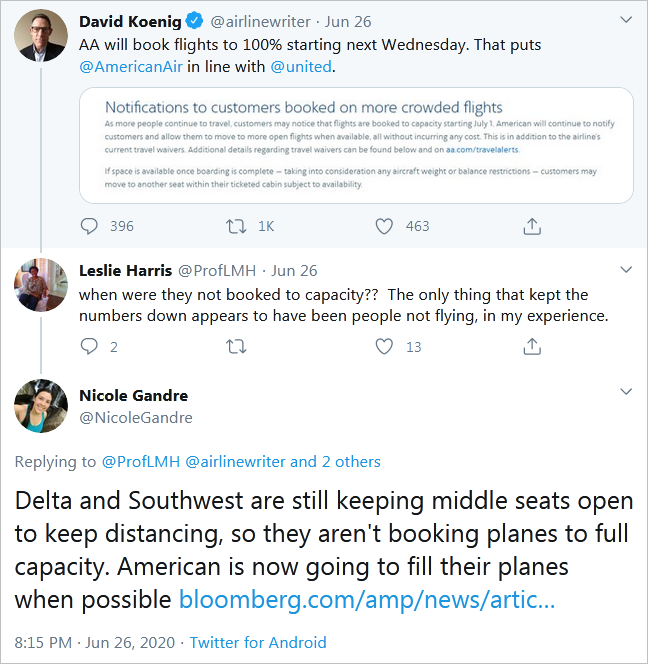- American Airlines is relaxing social distancing measures beginning in July.
- The carrier’s break-even load factor is the highest among the big four U.S. airlines.
- American is the most heavily indebted U.S. airline at the moment.
American Airlines (NASDAQ:AAL) will end the physical distancing policy on its flights in July. The decision comes at a time when the pandemic is ramping up again.
Nothing demonstrates American’s precarious financial position better than this. American’s debt now stands at $34 billion, making it the most indebted U.S. airline.
But even as the carrier relaxes the physical distancing measures, its less-heavily indebted rivals are doing the opposite. Delta Air Lines (NYSE:DAL) and Southwest Airlines (NYSE:LUV), which are in better financial shape, will continue to limit passengers beyond September.

American Airlines’ plan to relax physical distancing rules is giving Delta Air Lines and Southwest an advantage. | Source: Twitter
American is doing this to ensure it generates the maximum revenue per seat. Currently, it needs to fill more seats than its major rivals. American’s break-even load factor is 78.9% compared to 72.5% for Southwest.
But this desperate move greatly endangers the lives of its customers. It’s also unlikely to improve American’s fortunes. Here are three reasons why.
1. Stiff competition in the airline industry
Three months into the lockdown, U.S. air passenger numbers are still just a quarter of what they were a year ago.

The number of passengers flying is on the rise, but it’s still about 25% below year-ago levels. | Source TSA
With fewer passengers, airlines are competing fiercely. And American is not coping so well as economic pressures drive more flyers to discount airlines.
In April, Southwest became the world’s largest airline by scheduled seats. American was the leader in February.
And just this week, Southwest launched its annual fall fare sale.

Southwest Airlines has lowered fares in a bid to induce air travel. | Source: Twitter
Among the big four, American is in the worst position to respond to the competition.
American Airlines, the most complained-about carrier
According to the Office of the Aviation Consumer Protection, American had the highest number of complaints among the big four airlines.
The percentage of complaints lodged against American Airlines was 8.4% of the total filed in April, the most recent reported month.
Complaints against Delta were 6.9% of the total; Southwest had 5.3% and United Airlines (NASDAQ:UAL) had 5.1%.

Nearly 10% of all complaints filed by air travelers in April were related to American Airlines. | Source: Office of the Aviation Consumer Protection
With such a lousy customer service record, American Airlines is at a disadvantage compared to rivals.
2. Relaxing physical distancing will backfire
American’s decision to end physical distancing will damage its brand. Airlines are touting hospital-grade air filters and deep cleaning as preventive measures against the pandemic. But it will be a public relations nightmare if American passengers get infected.
As cases continue to rise in the U.S., American is likely to lose customers for this reckless act. The health-conscious will not want to fly American, given all the unknown risks.

American Airlines is harming its brand by relaxing social distancing measures. | Source: Twitter
3. The second wave of traffic slowdown could soon be here
On June 25, the Transportation Security Administration reported the highest number of U.S. passengers since March 18. However, with Texas and Florida reversing reopening plans, a slowdown in economic activity is expected. This will dampen air travel countrywide, and American Airlines will not be spared.

A growing number of cases could dampen air travel. | Source: Twitter
Relaxing social distancing measures will only add to American Airlines’ myriad problems.
Disclaimer: This article represents the author’s opinion and should not be considered investment or trading advice from CCN.com. The author holds no investment position in the above-mentioned securities.
Last modified: June 28, 2020 4:32 PM UTC






